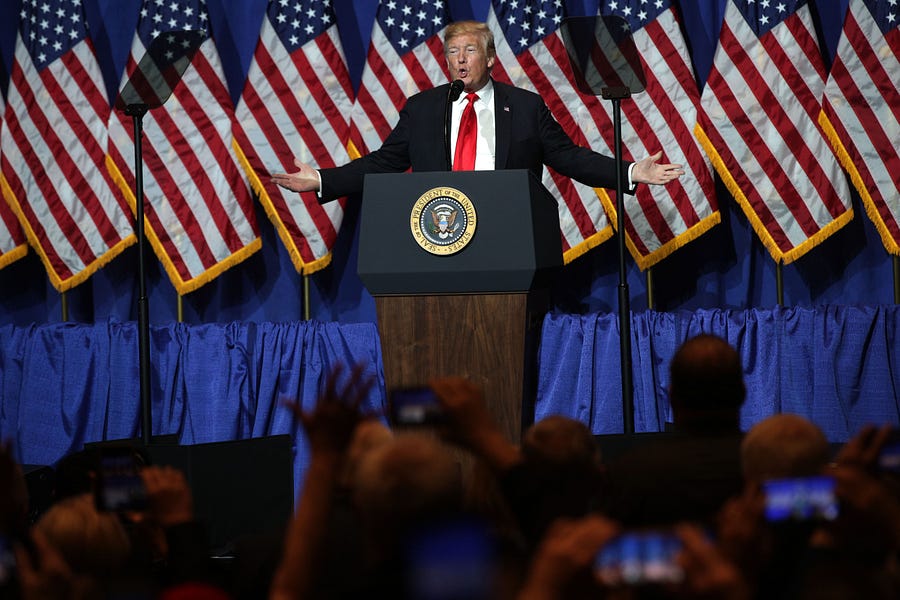The U.S. tariffs on Canadian aluminum that President Trump reimposed last week are a bad idea for many reasons: They hurt American manufacturers in the middle of a recession, have already sparked Canadian retaliation, stab a close ally in the back, and amplify uncertainty in an uncertain time. The tariffs do, however, have a silver lining: They should finally kill the myth of President Trump as something—anything—other than a protectionist.
Given the president’s longstanding views and numerous anti-trade actions, you may be forgiven for thinking that this debate has been settled already. Nevertheless, the last four years are replete with examples of the White House and its allies taking to the airwaves every time the president imposed new tariffs or threatened to blow up a U.S. trade agreement to proclaim that this isn’t actually protectionism. For trade watchers and those unwilling to ignore their lying eyes, such claims were always a stretch, but they often did enjoy a veneer of defensibility because of the context in which the president’s actions occurred.
Perhaps the most common defense of Trump’s trade moves is that they are only a temporary step backward in order to take two steps forward on freer trade. Trump, you see, was actually using tariffs to advance a “radical free trade agenda” and open markets in China, Canada, Europe, and elsewhere that have stubbornly remained closed for decades. Indeed, Trump himself has frequently defended his tariffs as a successful way to both bring foreign countries “to the table” and seal new trade deals, including the United States-Mexico-Canada Agreement (USMCA). “Without tariffs,” Trump said in 2018 about the USMCA and his “national security” tariffs on steel and aluminum (and threatened ones on automotive goods), “we wouldn’t be talking about a deal, just for those babies out there that keep talking about tariffs.” In those same comments he praised the “power of tariffs” to open other markets, and supporters have eagerly pointed out that USMCA (modestly) opens Canada’s dairy market. (Never mind that it also closes markets, too.)
As of last week, however, that excuse is toast. The USCMA, hailed by the president as “the largest, most significant, modern, and balanced trade agreement in history,” entered into force in July. Eliminating the U.S. tariffs on aluminum (and steel) from the other USMCA countries was a core condition for the deal’s ratification before the U.S. Congress and in both Canada and Mexico. Now the tariffs are back, and so is the Canadian retaliation (both theoretically permitted under the 2019 side agreement that nixed them in the first place). “Radical free trade,” indeed.
Trump’s new tariffs also fail their other most common defense, “national security.” The original steel and aluminum tariffs were implemented under a U.S. law, Section 232 of the Trade Expansion Act of 1962, that permits the president to take action against imports that “threaten to impair the national security” of the United States. At that time, the facts supporting those decisions, especially with respect to Canadian aluminum, were dubious at best: Canada is part of the United States’ own defense industrial base, and the U.S. and Canadian aluminum markets were highly integrated due to NAFTA and the countries’ comparative advantages. Nevertheless, the Trump administration could at least claim then that the tariffs were necessary to support an essential domestic industry and to prevent Chinese metals from entering the country through Canada.
But the bases for such claims have since disappeared. Chinese aluminum imports into the United States collapsed in 2019 as a result of new and high U.S. anti-dumping and countervailing duties on those products that were imposed in 2018. That same year, Canada implemented new measures to prevent the illegal “transshipment” of such metals through Canada and into the United States, and took further steps in 2019 as part of the aforementioned deal to lift U.S. tariffs. The USMCA also contains several new provisions intended to enhance enforcement of such violations or otherwise boost the North American aluminum industry.
At the same time, evidence has mounted that Trump’s tariffs on Canadian aluminum not only undermined the U.S. manufacturing sector due to higher prices and Canadian retaliation, but actually hurt U.S. aluminum companies, especially—but not only—the nation’s largest producer Alcoa (which has operations in both countries). Even the White House itself admitted in January of this year that the aluminum tariffs caused a surge in “derivative” aluminum products and hadn’t achieved their objectives: “[c]apacity utilization in the aluminum industry has improved, but it is still below the target capacity utilization that the Secretary recommended in his report.” Likely for these reasons, Trump’s decision last week to reimpose the aluminum tariffs elicited immediate and vocal opposition from both the National Association of Manufacturers and the Aluminum Association, which represents the “vast majority of domestic aluminum companies.”
Not included in that “vast majority,” of course, are the two U.S. aluminum companies, Century Aluminum and Magnitude 7 Metals, that “have lobbied intensely for the tariffs to be re-imposed” and want U.S. consumers to pad their bottom lines. And why do their demands outweigh those of the much larger Alcoa, the rest of the U.S. aluminum industry, and all other American manufacturers? Well, it sure doesn’t seem like national security: “two of Century’s four smelters are in Kentucky, while Magnitude 7 operates in Missouri, two states vital to Trump’s electoral fortunes.” Century’s biggest shareholder, moreover, is the Swiss trading company Glencore, whose former employee owns Magnitude 7 and who “holds the exclusive rights to sell Russian-made aluminum in the U.S.” Oh.
Conspiracy theories aside, there’s simply nothing here to indicate an urgent national security threat necessitating the re-imposition of painful tariffs on imports from a close ally—one that had already agreed to implement the president’s signature trade deal and further regulate the product at issue. Instead, it’s just plain old protectionism, and—as with the rest of Trump’s trade policies—it’s time we stop pretending otherwise.
Photograph by Alex Wong/Getty Images.








Please note that we at The Dispatch hold ourselves, our work, and our commenters to a higher standard than other places on the internet. We welcome comments that foster genuine debate or discussion—including comments critical of us or our work—but responses that include ad hominem attacks on fellow Dispatch members or are intended to stoke fear and anger may be moderated.
You are currently using a limited time guest pass and do not have access to commenting. Consider subscribing to join the conversation.
With your membership, you only have the ability to comment on The Morning Dispatch articles. Consider upgrading to join the conversation everywhere.